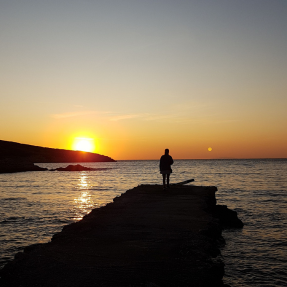
Coping with Change as the Seasons Turn
Change can feel wobbly. Even the gentle shift from summer to autumn can unsettle our rhythms, sleep, mood, energy, plans. At Skyros, we hear it every year: the season changes and life asks us to change with it. The good news? Small, steady practices help you adapt, and there’s solid science behind them.
Why change feels hard
Our brains like predictability; uncertainty takes extra energy. That’s why even positive change (new routines, new goals) can feel tiring at first. The aim isn’t to resist change, but to flex with it.
Use the season as your “fresh start”
Psychologists call dates like the start of autumn temporal landmarks. They create a mental “chapter break” that boosts motivation and follow-through, a perfect moment to begin (or begin again). Try pairing the season switch with one tiny new habit (see the 7-day plan below).
Five evidence-based anchors for change
1) Practise psychological flexibility (not rigid positivity)
People who can notice difficult thoughts and feelings, make room for them, and still take a values-based step, cope better with change and stress. Psychological flexibility is strongly linked with mental health and adaptation. Try this three-step micro-skill: Name it → Breathe → Choose a next small step that matters.
2) Meet yourself with self-compassion
Being kind (not harsh) with yourself during transition isn’t indulgence, it’s smart physiology. Training in self-compassion reliably increases wellbeing and resilience over time. When change feels tough, try: “This is hard; may I be kind to myself; what would help right now?”
3) Go outside for awe, not just steps
A brief, weekly awe walk, looking for things that spark wonder, has been shown to reduce daily distress and lift prosocial positive emotions. In practice: 15–20 minutes outdoors, phone away, eyes up. Notice light, texture, sound; let something surprise you.
4) Touch nature to quiet mental “looping”
When change kicks up rumination, a simple nature dose helps. A 90-minute walk in a natural setting reduced both self-reported rumination and neural activity in a region linked to it. Even shorter pockets of green help, a park bench counts.
5) Build tiny routines that hold you
Routines don’t have to be rigid. One small anchor in the morning (light, movement, or a two-minute notebook check-in) and one in the evening (screen-light down, breath up) can stabilise your day while everything else shifts.
A 7-day Skyros plan to ease into autumn
-
Day 1 — Name & aim (5 mins): Write one sentence: What’s changing? and one value you want to carry into it.
-
Day 2 — Fresh-start cue (2 mins): Tie a tiny habit to a cue (e.g., after morning tea, three deep breaths by an open window).
-
Day 3 — Awe walk (15 mins): Notice three surprising/beautiful things; tell someone one of them.
-
Day 4 — Micro-connection (5 mins): Message a friend with genuine appreciation.
-
Day 5 — Self-compassion pause (1 min): This is hard → I’m not alone → What would help now?
-
Day 6 — Make space, not rules (20 mins): A “white-space” slot for anything nourishing (read, stretch, sketch).
-
Day 7 — Review & renew (5 mins): What helped? Keep one thing for next week.

How Skyros helps
On the island, change is made gentler by three things our guests mention again and again: community, creativity, and nature. Shared meals and conversations offer belonging; creative sessions turn uncertainty into expression; time outdoors settles the nervous system. You can bring the same ingredients home, in small, human-sized doses.
Keep the momentum with Skyros Connect
The season may turn, but the Skyros spirit carries on. Skyros Connect is our year-round online community with monthly live sessions, creative tasters, writing hours and warm conversation, an easy way to stay steady through life’s changes (with a free three-month trial for new members). If you’re navigating a transition, you don’t have to do it alone. You can join at https://connect.skyros.com/











Comments
There are no comments yet. Why not be the first?